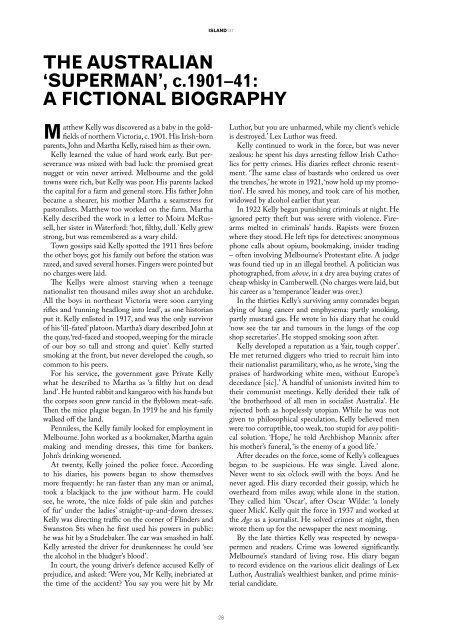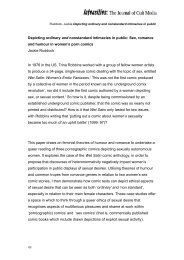AN AUSTRALIAN SUPERMAN
islandsuperman
islandsuperman
Create successful ePaper yourself
Turn your PDF publications into a flip-book with our unique Google optimized e-Paper software.
ISL<strong>AN</strong>D137<br />
THE AUSTRALI<strong>AN</strong><br />
‘SUPERM<strong>AN</strong>’, c.1901–41:<br />
A FICTIONAL BIOGRAPHY<br />
Matthew Kelly was discovered as a baby in the goldfields<br />
of northern Victoria, c. 1901. His Irish-born<br />
parents, John and Martha Kelly, raised him as their own.<br />
Kelly learned the value of hard work early. But perseverance<br />
was mixed with bad luck: the promised great<br />
nugget or vein never arrived. Melbourne and the gold<br />
towns were rich, but Kelly was poor. His parents lacked<br />
the capital for a farm and general store. His father John<br />
became a shearer, his mother Martha a seamstress for<br />
pastoralists. Matthew too worked on the farm. Martha<br />
Kelly described the work in a letter to Moira McRussell,<br />
her sister in Waterford: ‘hot, filthy, dull.’ Kelly grew<br />
strong, but was remembered as a wary child.<br />
Town gossips said Kelly spotted the 1911 fires before<br />
the other boys; got his family out before the station was<br />
razed, and saved several horses. Fingers were pointed but<br />
no charges were laid.<br />
The Kellys were almost starving when a teenage<br />
nationalist ten thousand miles away shot an archduke.<br />
All the boys in northeast Victoria were soon carrying<br />
rifles and ‘running headlong into lead’, as one historian<br />
put it. Kelly enlisted in 1917, and was the only survivor<br />
of his ‘ill-fated’ platoon. Martha’s diary described John at<br />
the quay, ‘red-faced and stooped, weeping for the miracle<br />
of our boy so tall and strong and quiet’. Kelly started<br />
smoking at the front, but never developed the cough, so<br />
common to his peers.<br />
For his service, the government gave Private Kelly<br />
what he described to Martha as ‘a filthy hut on dead<br />
land’. He hunted rabbit and kangaroo with his hands but<br />
the corpses soon grew rancid in the flyblown meat-safe.<br />
Then the mice plague began. In 1919 he and his family<br />
walked off the land.<br />
Penniless, the Kelly family looked for employment in<br />
Melbourne. John worked as a bookmaker, Martha again<br />
making and mending dresses, this time for bankers.<br />
John’s drinking worsened.<br />
At twenty, Kelly joined the police force. According<br />
to his diaries, his powers began to show themselves<br />
more frequently: he ran faster than any man or animal,<br />
took a blackjack to the jaw without harm. He could<br />
see, he wrote, ‘the nice folds of pale skin and patches<br />
of fur’ under the ladies’ straight-up-and-down dresses.<br />
Kelly was directing traffic on the corner of Flinders and<br />
Swanston Sts when he first used his powers in public:<br />
he was hit by a Studebaker. The car was smashed in half.<br />
Kelly arrested the driver for drunkenness: he could ‘see<br />
the alcohol in the bludger’s blood’.<br />
In court, the young driver’s defence accused Kelly of<br />
prejudice, and asked: ‘Were you, Mr Kelly, inebriated at<br />
the time of the accident? You say you were hit by Mr<br />
Luthor, but you are unharmed, while my client’s vehicle<br />
is destroyed.’ Lex Luthor was freed.<br />
Kelly continued to work in the force, but was never<br />
zealous: he spent his days arresting fellow Irish Catholics<br />
for petty crimes. His diaries reflect chronic resentment.<br />
‘The same class of bastards who ordered us over<br />
the trenches,’ he wrote in 1921, ‘now hold up my promotion’.<br />
He saved his money, and took care of his mother,<br />
widowed by alcohol earlier that year.<br />
In 1922 Kelly began punishing criminals at night. He<br />
ignored petty theft but was severe with violence. Firearms<br />
melted in criminals’ hands. Rapists were frozen<br />
where they stood. He left tips for detectives: anonymous<br />
phone calls about opium, bookmaking, insider trading<br />
– often involving Melbourne’s Protestant elite. A judge<br />
was found tied up in an illegal brothel. A politician was<br />
photographed, from above, in a dry area buying crates of<br />
cheap whisky in Camberwell. (No charges were laid, but<br />
his career as a ‘temperance’ leader was over.)<br />
In the thirties Kelly’s surviving army comrades began<br />
dying of lung cancer and emphysema: partly smoking,<br />
partly mustard gas. He wrote in his diary that he could<br />
‘now see the tar and tumours in the lungs of the cop<br />
shop secretaries’. He stopped smoking soon after.<br />
Kelly developed a reputation as a ‘fair, tough copper’.<br />
He met returned diggers who tried to recruit him into<br />
their nationalist paramilitary, who, as he wrote, ‘sing the<br />
praises of hardworking white men, without Europe’s<br />
decedance [sic].’ A handful of unionists invited him to<br />
their communist meetings. Kelly derided their talk of<br />
‘the brotherhood of all men in socialist Australia’. He<br />
rejected both as hopelessly utopian. While he was not<br />
given to philosophical speculation, Kelly believed men<br />
were too corruptible, too weak, too stupid for any political<br />
solution. ‘Hope,’ he told Archbishop Mannix after<br />
his mother’s funeral, ‘is the enemy of a good life.’<br />
After decades on the force, some of Kelly’s colleagues<br />
began to be suspicious. He was single. Lived alone.<br />
Never went to six o’clock swill with the boys. And he<br />
never aged. His diary recorded their gossip, which he<br />
overheard from miles away, while alone in the station.<br />
They called him ‘Oscar’, after Oscar Wilde: ‘a lonely<br />
queer Mick’. Kelly quit the force in 1937 and worked at<br />
the Age as a journalist. He solved crimes at night, then<br />
wrote them up for the newspaper the next morning.<br />
By the late thirties Kelly was respected by newspapermen<br />
and readers. Crime was lowered significantly.<br />
Melbourne’s standard of living rose. His diary began<br />
to record evidence on the various elicit dealings of Lex<br />
Luthor, Australia’s wealthiest banker, and prime ministerial<br />
candidate.<br />
28




